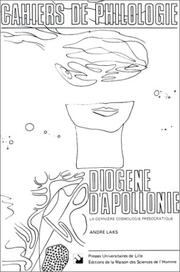| Listing 1 - 5 of 5 |
Sort by
|

ISBN: 285939222X 9782859392222 Year: 1983 Volume: 9 Publisher: Lille: Presses universitaires de Lille,
Abstract | Keywords | Export | Availability | Bookmark
 Loading...
Loading...Choose an application
- Reference Manager
- EndNote
- RefWorks (Direct export to RefWorks)
Diogenes, --- Diogenes of Apollonia --- Diogène, --- Διογένης, --- Diogenēs, --- Diogenes, - of Apollonia, - active 5th century BC

ISBN: 9786612357503 0520931025 1282357506 1601295227 9780520931022 1429413751 9781429413756 9781601295224 9781282357501 0520241487 9780520241480 6612357509 Year: 2006 Publisher: Berkeley : University of California Press,
Abstract | Keywords | Export | Availability | Bookmark
 Loading...
Loading...Choose an application
- Reference Manager
- EndNote
- RefWorks (Direct export to RefWorks)
This authoritative and sweeping compendium, the second volume in Getzel Cohen's organized survey of the Greek settlements founded or refounded in the Hellenistic period, provides historical narratives, detailed references, citations, and commentaries on all the settlements in Syria, The Red Sea Basin, and North Africa from 331 to 31 BCE. Organized geographically, the volume pulls together discoveries and debates from dozens of widely scattered archaeological and epigraphic projects. Cohen's magisterial breadth of focus enables him to provide more than a compilation of information; the volume also contributes to ongoing questions and will point the way toward new avenues of inquiry.
Cities and towns, Ancient --- Geography, Ancient --- Greece --- Red Sea Region --- Africa, North --- Syria --- Arab countries --- al-Yūnān --- Ancient Greece --- Ellada --- Ellas --- Ellēnikē Dēmokratia --- Elliniki Dimokratia --- Grčija --- Grèce --- Grecia --- Gret︠s︡ii︠a︡ --- Griechenland --- Hellada --- Hellas --- Hellenic Republic --- Hellēnikē Dēmokratia --- Kingdom of Greece --- République hellénique --- Royaume de Grèce --- Vasileion tēs Hellados --- Xila --- Yaṿan --- Yūnān --- Ελληνική Δημοκρατία --- Ελλάς --- Ελλάδα --- Греция --- اليونان --- يونان --- 希腊 --- Colonies --- History. --- History --- abila. --- alexander. --- alexandreia. --- ancient greece. --- ancient world. --- antigoneia. --- antigonos. --- antioch near daphne. --- antioch. --- antiochos iii. --- apameia. --- apollonia. --- appian. --- archaeology. --- architecture. --- chalcidice. --- commagene. --- egypt. --- eupatreia. --- geography. --- greek history. --- greek settlements. --- hellenism. --- hellenistic period. --- macedonia. --- maroneia. --- nonfiction. --- north africa. --- phoenicia. --- red sea basin. --- religion. --- settlements. --- syria. --- tegea.

ISBN: 1282271369 9786612271366 1400825075 9781400825073 9780691058092 0691058091 9781282271364 Year: 2002 Publisher: Princeton, NJ ; Oxford, Oxfordshire : Princeton University Press,
Abstract | Keywords | Export | Availability | Bookmark
 Loading...
Loading...Choose an application
- Reference Manager
- EndNote
- RefWorks (Direct export to RefWorks)
Is "space" a thing, a container, an abstraction, a metaphor, or a social construct? This much is certain: space is part and parcel of the theater, of what it is and how it works. In The Play of Space, noted classicist-director Rush Rehm offers a strikingly original approach to the spatial parameters of Greek tragedy as performed in the open-air theater of Dionysus. Emphasizing the interplay between natural place and fictional setting, between the world visible to the audience and that evoked by individual tragedies, Rehm argues for an ecology of the ancient theater, one that "nests" fifth-century theatrical space within other significant social, political, and religious spaces of Athens. Drawing on the work of James J. Gibson, Kurt Lewin, and Michel Foucault, Rehm crosses a range of disciplines--classics, theater studies, cognitive psychology, archaeology and architectural history, cultural studies, and performance theory--to analyze the phenomenology of space and its transformations in the plays of Aeschylus, Sophocles, and Euripides. His discussion of Athenian theatrical and spatial practice challenges the contemporary view that space represents a "text" to be read, or constitutes a site of structural dualities (e.g., outside-inside, public-private, nature-culture). Chapters on specific tragedies explore the spatial dynamics of homecoming ("space for returns"); the opposed constraints of exile ("eremetic space" devoid of normal community); the power of bodies in extremis to transform their theatrical environment ("space and the body"); the portrayal of characters on the margin ("space and the other"); and the tragic interactions of space and temporality ("space, time, and memory"). An appendix surveys pre-Socratic thought on space and motion, related ideas of Plato and Aristotle, and, as pertinent, later views on space developed by Newton, Leibniz, Descartes, Kant, and Einstein. Eloquently written and with Greek texts deftly translated, this book yields rich new insights into our oldest surviving drama.
Theater --- Space and time in literature. --- Greek drama (Tragedy) --- Greek drama --- Space and time as a theme in literature --- History --- History and criticism. --- Ancient presentation --- Presentation, Ancient --- Space and time in literature --- History and criticism --- Space perception. --- Spatial perception --- Perception --- Spatial behavior --- Figure-ground perception --- Geographical perception --- 18.43 ancient Greek literature. --- Greek drama (Tragedy). --- Grieks. --- Ruimtelijke aspecten. --- Theater. --- Théâtre --- Tragedies. --- Tragédie grecque. --- Voorstellingen (uitvoerende kunsten). --- To 500. --- Greece. --- Theater - Greece --- Theater - History - To 500 --- Greek drama (Tragedy) - History and criticism --- Aegina. --- Alcibiades. --- Amazons. --- Beckett, Samuel. --- Chomsky, Noam. --- Diogenes of Apollonia. --- Eleatics. --- Empedocles. --- Foucault, Michel. --- Gellie, George. --- Goldhill, Simon. --- Halliburton, David. --- Heidegger, Martin. --- Heraclitus. --- Jameson, Michael. --- Lewin, Kurt. --- Loraux, Nicole. --- Newton, Isaac. --- Nightingale, Andrea. --- Palladion. --- Panhellenic norms. --- Parminides. --- Pnyx. --- Seaford, Richard. --- Themistocles. --- actors. --- architecture. --- dance. --- elements. --- ephebeia. --- exile. --- hero cult. --- landscape. --- memory. --- orality. --- role doubling. --- semiotics.
Book
ISBN: 1282458280 9786612458286 1400827450 9781400827459 Year: 2008 Publisher: Princeton Princeton University Press
Abstract | Keywords | Export | Availability | Bookmark
 Loading...
Loading...Choose an application
- Reference Manager
- EndNote
- RefWorks (Direct export to RefWorks)
Explaining the Cosmos is a major reinterpretation of Greek scientific thought before Socrates. Focusing on the scientific tradition of philosophy, Daniel Graham argues that Presocratic philosophy is not a mere patchwork of different schools and styles of thought. Rather, there is a discernible and unified Ionian tradition that dominates Presocratic debates. Graham rejects the common interpretation of the early Ionians as "material monists" and also the view of the later Ionians as desperately trying to save scientific philosophy from Parmenides' criticisms. In Graham's view, Parmenides plays a constructive role in shaping the scientific debates of the fifth century BC. Accordingly, the history of Presocratic philosophy can be seen not as a series of dialectical failures, but rather as a series of theoretical advances that led to empirical discoveries. Indeed, the Ionian tradition can be seen as the origin of the scientific conception of the world that we still hold today.
Philosophie ancienne. --- Sciences anciennes. --- Sciences --- Philosophy, Ancient. --- Science, Ancient. --- Science --- Natural science --- Natural sciences --- Science of science --- Ancient philosophy --- Greek philosophy --- Philosophy, Greek --- Philosophy, Roman --- Roman philosophy --- Ancient science --- Science, Primitive --- Histoire. --- History. --- History --- Pre-Socratic philosophers. --- Pre-Socratics --- Presocratic philosophers --- Presocratics --- Philosophers --- Absolute (philosophy). --- Alcmaeon of Croton. --- Alexander of Aphrodisias. --- Allusion. --- Ambiguity. --- Analogy. --- Anaxagoras. --- Anaximander. --- Anaximenes. --- Antidosis. --- Apeiron (cosmology). --- Aristotle. --- Atomism. --- Causality. --- Chemical element. --- Chemical formula. --- Classical element. --- Coeus. --- Concept. --- Contradiction. --- Cosmogony. --- Cratylus. --- Crius. --- Cronus. --- Democritus. --- Diogenes of Apollonia. --- Dualism (philosophy of mind). --- Dualism. --- Eleatics. --- Emergence. --- Empedocles. --- Empirical evidence. --- Essence. --- Existence. --- Explanandum. --- Explanation. --- Explication. --- Fallacy. --- First principle. --- Four causes. --- Greek Philosophy. --- Hippias. --- Hypothesis. --- Ignoratio elenchi. --- Inference. --- Inquiry. --- Instance (computer science). --- Isocrates. --- Leucippus. --- Lucretius. --- Material monism. --- Meteorology. --- Monism. --- Multitude. --- Mythology. --- Natural philosophy. --- Natural science. --- On Generation and Corruption. --- On the Heavens. --- Ontology. --- Ousia. --- Parmenides. --- Peripatetic school. --- Phenomenon. --- Philolaus. --- Philosopher. --- Philosophical theory. --- Philosophy. --- Pre-Socratic philosophy. --- Premise. --- Principle. --- Process philosophy. --- Prose. --- Pythagoreanism. --- Quantity. --- Rarefaction. --- Reality. --- Reason. --- Science. --- Scientific method. --- Scientist. --- Sophist. --- Substance theory. --- Teleology. --- Test theory. --- The Philosopher. --- Theogony. --- Theophrastus. --- Theoretical physics. --- Theory of Forms. --- Theory of change. --- Theory. --- Thomas Kuhn. --- Thought. --- Timaeus (dialogue). --- Trace Amounts. --- Treatise. --- Unity of opposites. --- World view. --- Xenophanes.
Book
ISBN: 9781400877607 1400877601 0691071543 0691627819 Year: 1931 Publisher: Princeton, New Jersey : Princeton University Press,
Abstract | Keywords | Export | Availability | Bookmark
 Loading...
Loading...Choose an application
- Reference Manager
- EndNote
- RefWorks (Direct export to RefWorks)
A scholarly account of the views on the nature of God held by Greek philosophers up to the time of Socrates.Originally published in 1937.The Princeton Legacy Library uses the latest print-on-demand technology to again make available previously out-of-print books from the distinguished backlist of Princeton University Press. These editions preserve the original texts of these important books while presenting them in durable paperback and hardcover editions. The goal of the Princeton Legacy Library is to vastly increase access to the rich scholarly heritage found in the thousands of books published by Princeton University Press since its founding in 1905.
Religious thought. --- Monotheism. --- Gods. --- Philosophy, Ancient. --- Religion --- Pantheism --- Theism --- Trinity --- Polytheism --- Deities --- Divine beings --- Divinities --- Mythology, Classical --- Misotheism --- Mythology --- Religions --- Theomachy --- Ancient philosophy --- Greek philosophy --- Philosophy, Greek --- Philosophy, Roman --- Roman philosophy --- Greece --- Religion. --- Absolute (philosophy). --- Aether (mythology). --- All things. --- Allegory. --- Anaxagoras. --- Anaximander. --- Anaximenes. --- Anthropomorphism. --- Antithesis. --- Apeiron (cosmology). --- Aristotelianism. --- Aristotle. --- Atomism. --- Causality. --- Charites. --- Chrysippus. --- Classical planet. --- Clement of Alexandria. --- Conceptions of God. --- Cosmogony. --- Counter-Earth. --- De rerum natura. --- Deity. --- Democritus. --- Diogenes of Apollonia. --- Divine law. --- Divinization (Christian). --- Dualism. --- Empedocles. --- Epicureanism. --- Epicurus. --- Epistemology. --- Erebus. --- Erudition. --- Essence. --- Euphorbus. --- Explanation. --- First principle. --- Gilbert Murray. --- God. --- Greco-Roman mysteries. --- Greek Philosophy. --- Henotheism. --- Heraclitus of Ephesus. --- Herodotus. --- Immutability (theology). --- Ionians. --- Leucippus. --- Lightness (philosophy). --- Lucretius. --- Melissus of Samos. --- Monism. --- Multitude. --- Nous. --- Oceanus. --- Omnipotence. --- Panpsychism. --- Parmenides. --- Personal god. --- Phenomenon. --- Philolaus. --- Philosopher. --- Philosophy of religion. --- Philosophy of science. --- Philosophy. --- Physis. --- Platonism. --- Polemos. --- Polytheism. --- Pre-Socratic philosophy. --- Pythagoras. --- Pythagoreanism. --- Pythia. --- Reality. --- Religious philosophy. --- Scientist. --- Sextus Empiricus. --- Soul. --- Speculative reason. --- Stesichorus. --- Stoicism. --- The Other Gods. --- The Philosopher. --- Theism. --- Themistius. --- Theogony. --- Theology. --- Theophrastus. --- Theoretical physics. --- Theory of Forms. --- Theory. --- Thought. --- Timaeus (dialogue). --- Uranus (mythology). --- Wissenschaft. --- Xenophanes. --- Zagreus. --- Zeno of Elea. --- Zeus.
| Listing 1 - 5 of 5 |
Sort by
|

 Search
Search Feedback
Feedback About UniCat
About UniCat  Help
Help News
News